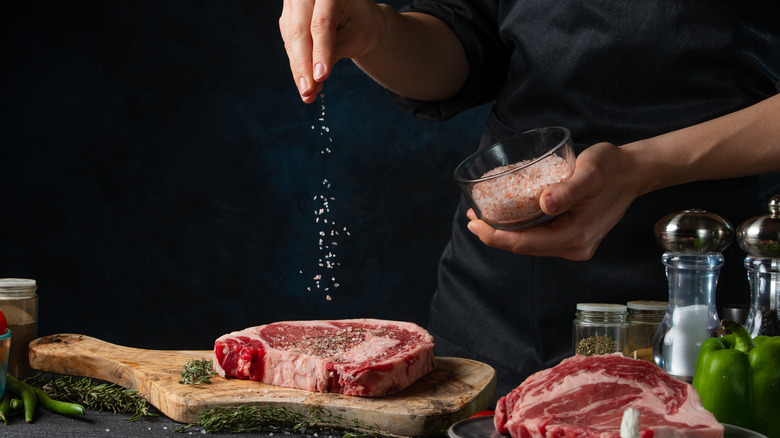The Meat Seasoning Technique Samin Nosrat Swears By
Watching just a few minutes of Samin Nosrat's Netflix series, "Salt Fat Acid Heat," it's clear the chef "lives to cook and eat with [her] friends." The show, which highlights Nosrat's infectious joy in the kitchen, is named after her New York Times bestselling, James Beard award-winning inaugural cookbook. Combining her love of writing and food, the "Salt Fat Acid Heat" book was the product of Nosrat's studies in English at UC Berkeley and in the kitchen at Alice Waters' Chez Panisse, per Ciao Samin.
With a goal of teaching home cooks how salt, fat, acid, and heat can make food taste better, Nosrat's Netflix series takes viewers along on her culinary travels from Liguria, Italy, to Berkley, California. Per Saveur, Nosrat demonstrates a rare "talent for elegantly and exuberantly articulating technique and the science behind it," cooking homestyle dishes like pesto and focaccia in the "Fat" episode while thoroughly explaining every step. The series' flavor-enhancing second episode, "Salt," meanwhile, breaks down how the everyday ingredient can improve your food when used correctly. In one demonstration, Nosrat prepares a steak, discussing her technique for coaxing the most flavor out of the meat.
Nosrat's salting technique
One of Nosrat's best tips for beginner cooks, as shared on "Salt Fat Acid Heat," is to remember "the power of salting meat in advance" (via Netflix). Whenever the cook buys meat, she uses the "wrist-wag" technique to season it — sprinkling salt thoroughly and evenly all over its surface — before placing it in the fridge. Nosrat says this is even better than salting the meat just before you cook it, as pre-salting the meat as soon as you buy it gives the mineral "enough time to do its magic." Nosrat uses the same technique when preparing her buttermilk marinated roast chicken, letting the salt permeate the meat while it marinates in the fridge.
For all-purpose salting, Nosrat prefers Kosher salt due to the large size of the salt crystals, making it "one-third as salty as fine sea salt or table salt." Nosrat's recipes also specify the salt brand, calling for Diamond Crystal as opposed to Morton, which is saltier per teaspoon.

